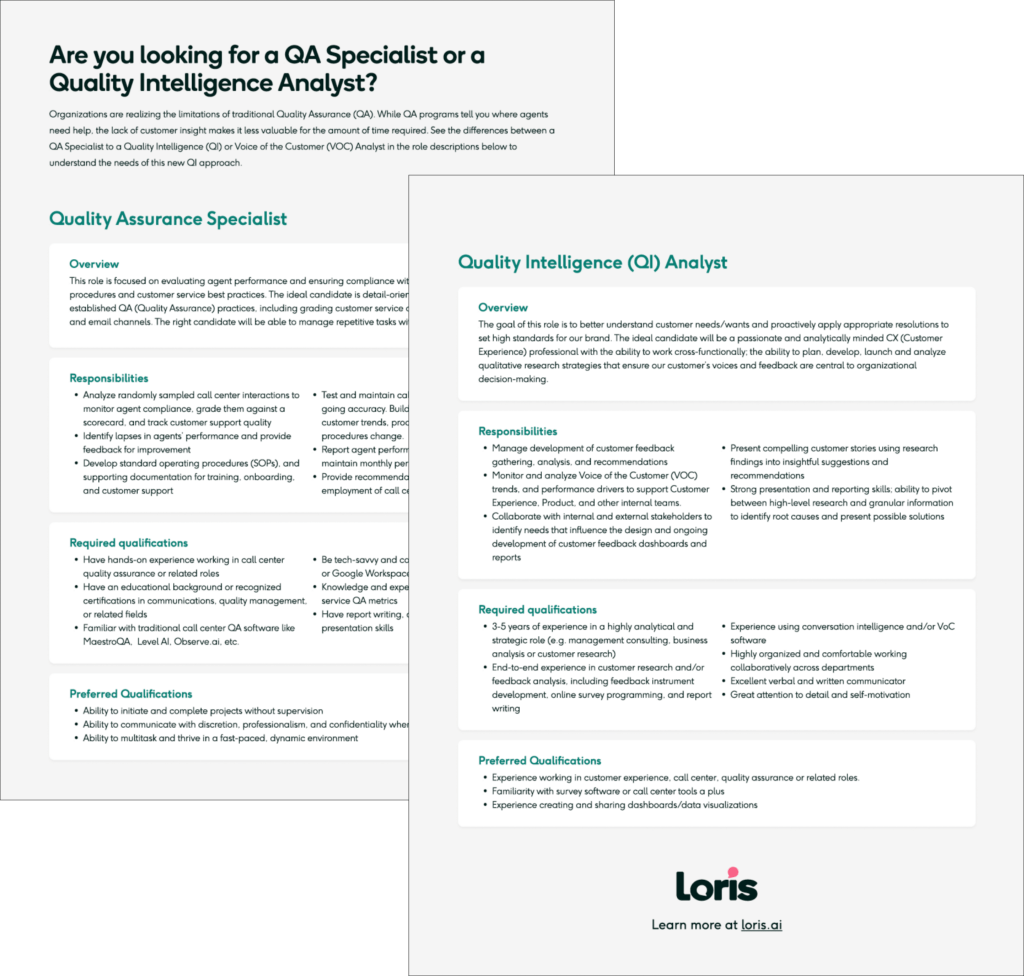
Quality Intelligence (QI) is the new term to describe the convergence of Quality Assurance (QA) and Voice of the Customer (VOC) programs. But rather than just another acronym, it’s a new way of thinking about how you measure and improve your customer service program. This shift in perspective requires a new, more empowered quality intelligence analyst to not only understand customer issues, but also articulate the impact and recommended remediation. But before we get there, we have to understand the key differences in these roles.
The Traditional Quality Assurance Specialist
A customer service Quality Assurance (QA) Specialist focuses on how customer service agents performed. They do this a few different ways:
1. Monitoring call, chat, and email quality
This function was, and often still is, done by manually listening to calls and rating the agent’s performance against a scorecard. The main drawback to this approach is two-fold: a QA specialist can only assess so many calls and it can take up to 20 minutes to assess a six-minute call. This results in about 2% of all conversations being assessed, which provides limited insight.
2. Ensuring adherence to scripts and protocols
Like the above, the QA specialist assesses conversations to see if internal operating procedures have been met. In some cases, this is a binary criteria where the agent did or did not perform the action. But often, it’s subjective leading to different interpretations from different QA specialists. To maintain consistency, the QA team holds calibration sessions to ensure they score conversations the same.
3. Evaluating individual agent performance
These collective assessments, along with traditional customer service performance metrics like Average Handle Time (AHT) and First Contact Resolution (FCR). Using a scorecard, the QA specialist provides a score to each agent, typically based on multiple samples of randomly selected conversations. QA scores and scorecards are then provided to agent team leads and/or agents.
4. Providing feedback and coaching to agents
Depending on the size of the organization, QA specialists can also be the agent coaches or they provide feedback about agent quality via the agent team lead. Due to the subjective nature of QA assessment, agents can raise a dispute if they disagree with the QA team’s scorecard. Like calibration sessions, this is another process that involves multiple internal parties to come to a resolution to settle inconsistencies.
5. Maintaining quality standards
The QA specialist is charged with maintaining and if possible improving quality standards. But besides agent feedback and scoring, they have little control over ongoing quality. Since QA specialists are incentivized to produce high scores, and get push back when agents are scored below average, there are cases in which scores are inflated, such that any QA below 90 is “low”.
Their primary goal is to ensure that customer interactions meet predefined quality standards, often by manually reviewing calls, chats, or emails after they occur. While this role is important for maintaining consistent service levels, it lacks the customer’s perspective. It also relies on customer service agents to consistently tag and record calls, when they are also being incentivized to get to the next customer as quickly as possible. This type of workflow makes it hard to really understand broader customer trends.
QA vs QI Analyst Job Descriptions
Quality Assurance and Quality Intelligence analysts have different tasks, skill sets, and perspective on the customer experience. See the real difference in their roles in the job description for each – and use the one that best fits the needs of your organization.
The Quality Intelligence Analyst: A broader perspective
In contrast, the Quality Intelligence (QI) Analyst represents a more holistic and proactive approach to customer experience. This role goes beyond traditional quality assurance by:
1. Analyzing Voice of Customer (VOC) data to identify trends and insights
Instead of relying on the agent’s QA assessment to understand the customer experience, they go directly to customer conversations to spot trends and emerging issues. By bringing together customer feedback from and agent performance, the QI analyst can see the full picture of the customer experience.
2. Developing and managing customer experience dashboards and reports
Unlike the QA specialist, the QI analyst shares their insight across the wider organization. Because of this, they need to be able to clearly record and present interesting trends across
3. Collaborating across departments to drive CX improvements
This approach enables the QI analyst to be the central hub for customer insight, enabling them to relay information to specific internal departments. These teams can use it to better understand what customers think of their products and where they’re getting stuck or confused.
4. Using advanced analytics to predict and prevent issues
But the QI analyst isn’t just an internal reporting role. They’re also responsible for being the early warning system for customer service anomalies and emerging issues.
5. Translating customer insights into actionable recommendations for the business
Using this broader perspective, and given the immediate availability of customer data, QI analysts can highlight which issues are a higher priority and suggest remediation steps.
The QI Analyst serves as a bridge between customer feedback and organizational decision-making. They don’t just ensure quality; they drive continuous improvement based on customer needs and preferences in a way that’s actionable.
Key Differences between a Quality Assurance and Quality Intelligence Analyst
- Scope: While QA Specialists focus on individual interactions, Quality Intelligence Analysts look at the bigger picture, analyzing trends across 100% of customer conversations.
- Data Usage: Traditional QA relies primarily on call monitoring and scorecards. Quality Intelligence leverages your entire body of customer interactions across email, calls, chat, and messaging apps.
- Proactivity: QA is often reactive, addressing issues after they occur. Quality Intelligence aims to predict and prevent issues before they impact customers.
- Cross-functional Collaboration: Quality Intelligence Analysts work closely with various departments, including Product, Marketing, and Operations, to drive customer-centric improvements throughout the organization.
- Skill Set: While both roles require attention to detail, Quality Intelligence Analysts need strong analytical skills, familiarity with data visualization tools, and the ability to translate complex data into actionable insights.
- Impact: QA specialists typically impact agent performance and adherence to standards. Quality Intelligence Analysts can influence product development, marketing strategies, and overall business decisions.
Is QI the Future of Customer Experience?
As businesses increasingly recognize the value of customer-centricity over rote process, this new Quality Intelligence Analyst role is becoming critical. This shift represents a move from simply monitoring quality to actively shaping the customer experience based on data-driven insights.
Traditional Quality Assurance has its place. But it’s becoming clear that a clear understanding of the data should be the trigger for a process like QA, rather than using a subjective, manual process like QA assessment to collect a small set of limited data. As businesses continue to compete on the basis of customer experience, roles like the Quality Intelligence Analyst will be instrumental in operationalizing conversation data and acting on it quickly.
By combining the foundational principles of quality assurance with advanced analytics and a broader organizational perspective, Quality Intelligence Analysts are helping businesses not just meet customer expectations, but anticipate and exceed them.
